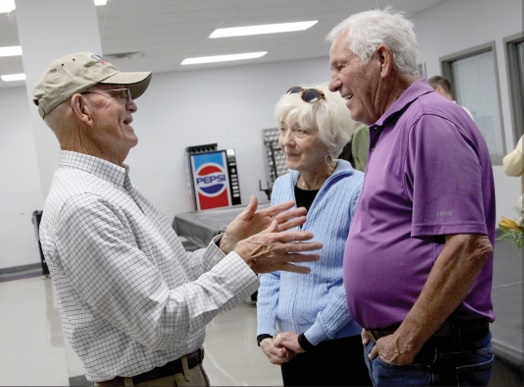State board changes fertilizer permitting
Companies applying residuals must go through DNR
By Sheila Harris sheilaharrisads@gmail.com
After June 30, the Missouri Fertilizer Control Board (MoFCB) will no longer issue fertilizer permits for the land-application of wastewater residuals.
The change comes after outcry from landowners in southwest Missouri led to a meeting of Missouri State representatives and senators at a meeting organized by Representative Dirk Deaton, R-Noel, in Pineville last month. In a follow up letter from Deaton’s office, dated April 4, legislators urged MoFCB Director Steve Taylor and the Board to reconsider the practice of issuing fertilizer permits on behalf of the state’s fertilizer control program (FCP) for materials containing sludge, biosolids or other process wastes intended for land-application.
Part of legislators’ concerns were that a fertilizer permit from the MoFCB exempted companies from the need to acquire a no-discharge permit from the Missouri State Department of Natural Resources (DNR), thus exempting the materials being land-applied from DNR permit conditions.
During a second meeting of legislators and representatives of the MoFCB in Jefferson City on April 11, the MoFCB expressed its intent to discontinue issuing fertilizer permits to companies who are giving away processing residuals to landowners. The reason, Taylor said, boils down to the market value of the residuals.
“Based on documentation obtained with information confirmed by those in attendance at the Pineville meeting, that [companies] offer their [process-waste materials] to landowners for free, [the materials thus have] no significant market value,” Taylor said. “The general intent of the Missouri fertilizer law is to provide consumer protection through truth in labeling and to protect fertilizer customers from experiencing significant economic harm due to the purchase of a fertilizer product that is deficient in essential plant nutrients. Since this material is free and has no significant market value, the regulations and requirements of Missouri fertilizer law do not apply, so a fertilizer permit is not required.”
DenaliWaterSolutions, based in Russellville, Ark., one company land-applying the majority of processing residuals in Barry, Newton and McDonald Counties, is not being singled out for the non-renewal of its fertilizer permits, which number over 100, Taylor said.
“All companies that apply for fertilizer permits should be selling a product with significant market value,” Taylor said. “Companies that offer material for free are not subject to the regulatory requirements of the MoFCB, and will not be required to obtain a MoFCB permit [after June 30, the expiration date of their current permits],” Taylor said.
Denali has been informed that the MoFCB is not denying them a permit, but rather has determined that a permit is not required, Taylor said.
Taylor said that with the change in the permitting process, Denali and other companies that land-apply processing- waste residuals will fall under the purview of the DNR after June 30.
“The Department is reviewing the Missouri Fertilizer Control Program’s decision and is considering the impacts to our authority and responsibility to regulate the Denali storage facilities and the land application activities,” said Heather Peters, with the Watershed Protection Section of the DNR. “We will be reaching out to Denali to discuss the removal of the fertilizer permit as of July 1, what that means for their activities, and what regulatory options we have proceeding forward.
“As for the penalties and enforcement action, the Missouri Department of Natural Resources, Water Pollution Control Branch, Compliance and Enforcement Section has an active enforcement case against Denali Water Solutions and cannot comment on the details of an ongoing enforcement case.”
Companies are already under the purview of the DNR when violations of the Missouri Clean Water Law occur, when discharges of their materials enter the waters of the state (WOTS).
A notice of violation was issued for one such runoff that occurred on Sept. 7, 2022, near the community of Southwest City in McDonald County.
“Thirty-six truckloads, or approximately 165,000 gallons, were land-applied to a five-acre area and entered WOTS,” Deaton said.
Another DNR notice of violation was issued, Deaton said, after a March 1 runoff incident, when a subtractor for Denali over-applied residuals at the back of a large property near the McDonald/ Newton County line. Excess residuals ran down a hillside, onto neighboring property and into a tributary of Indian Creek, said DNR’s Brooks McNeill, who conducted an onsite investigation.
Deaton, who serves as the Vice-Chairman of the House Budget Committee, announced March 31 that he has secured funding in the Missouri state budget to support efforts to conduct water quality monitoring in the Elk River watershed in McDonald County. If the funding is approved by the senate and the governor, the monitoring, he said, will take place throughout the next state fiscal year and will include the Elk River, Buffalo Creek, Lost Creek, Little Lost Creek, Indian Creek, Middle Indian Creek, South Indian Creek, Bullskin Creek, Big Sugar Creek, Little Sugar Creek, Mike’s Creek, Butler Creek, and Mill Creek.
The funding secured by Deaton will allow for water quality testing throughout the fiscal year for various materials and pollutants.
“The funding represents a significant investment in the health of the Elk River watershed,” Deaton said. “I am pleased to have been able to secure this funding. The Elk River and its tributaries are a vital resource for Missouri and we must ensure that we preserve the waters for future generations while also addressing any concerns relating to water quality.”




